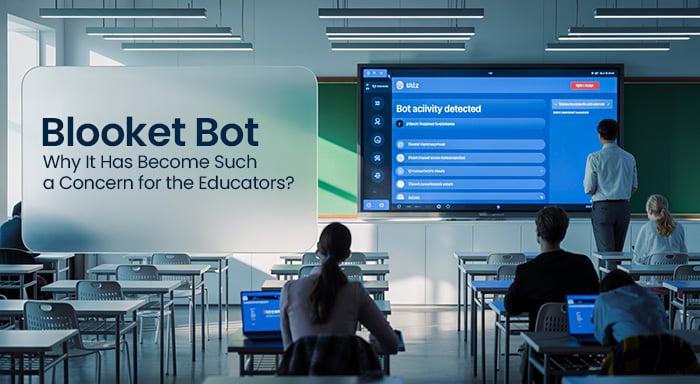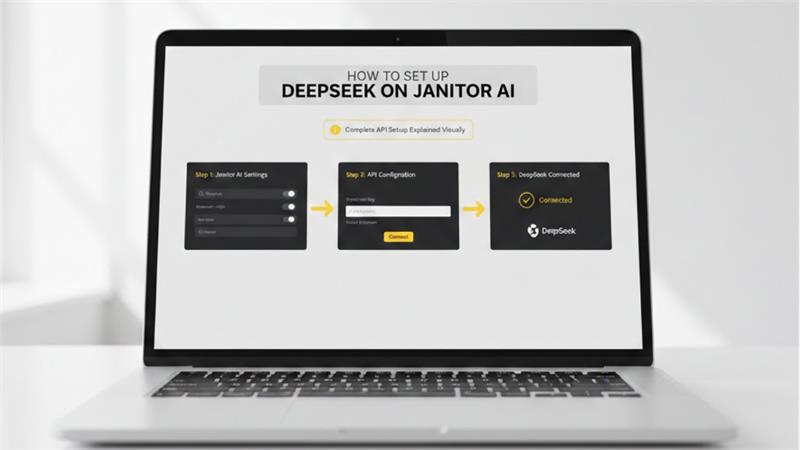As an educator, if you want to gamify the learning experience of the students, then there is no better platform than Blooket Bot. It is a widely popular platform and helps educators create quizzes and fast-paced challenges. In classrooms and online courses around the world, the platform has become intensely popular over the years. Among its vast audience, its core user base exists in Canada and United States. However, since 2025, due to the high popularity of the platform and competitiveness, students adopted unfair means to disrupt gameplay, manipulate sessions, and gain advantage. One of the methods they used was Blooket Bot.
This blog explains what is Blooket Bot, what are its risks, ways of safe use (if there are any) and much more.
What Is Blooket Bot?
It is a software tool specifically created for the Blooket platform. Just like any other bot, it behaves automatically and completes a task. Essentially, it can answer questions, join games, and collect points. Students use it to mark presence, collect benefits, and manipulate gameplay without playing the game. In the background, the codes run by themselves, creating bots that automatically answer questions, join games, and collect points. Why do students use Blooket bots? It is an interesting question; the reasons are several and vary from user to user. A few users just use them casually to prank students and classmates. Others do it to get unfair advantages and win games. There are also curious students who use them to see how they work.
Why Have Blooket Bots Suddenly Become Popular?
Blooket bots did not emerge suddenly. Their popularity can be traced to three predominant reasons listed as follows:
Popularity of Blooket
Teachers love to utilize Blooket because it makes the process of learning a lot more fun and interactive. Students can feel more connected to their subjects as they answer questions, collect coins, and try to outdo one another in real-time educational games. Students have the option to either play the game solo or be part of the team. Furthermore, the questions in the gameplay can be regarding any subject. All these features made learning a lot more exciting, which naturally elevated its popularity among students and teachers.
Blooket has become a favourite among teachers because it transforms traditional learning into an engaging, game-based experience. Students get actively involved by answering questions, earning coins, and competing in real-time, which helps them connect more deeply with the subject matter. Whether playing solo or in teams, they can tackle questions from virtually any topic. This blend of fun and education has made learning more enjoyable and dynamic, driving Blooket’s widespread popularity in classrooms and modern digital learning spaces like Classroom 15X.
However, with time, students started to misuse the platform by using bots and collecting points through unfair means.
High Competitiveness Among the Students
Gamification naturally creates a sense of competitiveness among the students. This competitiveness can be good as long as it is healthy. However, the desire to win games motivates students to try unethical means like Blooket bots. Instead of spending hours on subjects, bots feel like a convenient option for students.
Blooket Communities
The wide popularity of the Blooket led to some students forming groups and communities. These groups exposed students to quicker ways of earning virtual currency, points, and appealing “Blooks.” Not only is the promise of these rewards tempting, but peer pressure in these communities also plays a role. In these groups and communities, students share tools and methods to:
- Automatically join Blooket games.
- Answer questions in a fast way.
- Spam or disrupt the gameplay with fake players.
- Quickly unlock items and collect various coins.
Due to the growing popularity of the platform and communities, these bots have become more and more common.
How Blooket Bots Actually Work?
Blooket bots are similar to those used in other educational game platforms like Kahoot and Gimkit. These bots are essentially programs or scripts—typically written in Python or JavaScript—designed to automate actions within the game. Whether for testing, fun, or mischief, the purpose of these bots is to simulate multiple players, flood games, or manipulate gameplay in various ways.
- Automatically join the game via game code.
- Automatically answer quizzes, providing correct or incorrect answers.
- Collect amazing rewards or coins.
- Spam the game with a lot of fake participants.
Often, these bots are exchanged between players and students via online platforms. While some of these bots are free of cost, others ask for login information. Sharing login information with these bots is also a wrong practice as it can lead to cyberattacks.
Various Types of Bots
The main types of bots are explained in the below-mentioned points:
Answer Bots:
Bots try to automatically answer questions in quizzes. Sometimes, the questions can be answered with great accuracy, while in other cases, answers can also be incorrect.
Spam Bots:
Such bots can artificially inflate the number of participants, spamming the game entirely. Spamming can make the game quite slow or sometimes even impossible to play.
Token Bots:
Such bots can provide a quick way to earn coins. However, reports suggest that most of these token bots do not work at all. Some even prove to be scams.
Unlock Bots:
These bots promise users that they can unlock rare “Blooks” quite easily and quickly. However, these bots are generally quite risky or fake.
Is Using Blooket Bot Unfair Practice?
While some users use these bots just for pranks and fun, they are highly unethical and can be considered cheating. Using bots is against the policies and rules of the game.
Blooket is purpose built to gamify learning experiences. Its main aim is to help students learn concepts in a fun-filled and joyful manner. Bots can be harmful for the students as it can take the learning out of the equation.
But what will happen if you use a bot?
Blooket considers bots to be quite harmful for the overall development of the students. Here’s what can happen when bots are utilized:
- Your account can face suspension or even ban.
- You can use Blooks or even virtual coins if you are found to be using unethical practices like bots.
- Your school administration can take strict action against you and can even block your device.
- Teachers might be forced to stop using Blooket games, which can impact students who genuinely benefit from the platform.
Why Using Blooket Bots Is a Dangerous Practice?
Leveraging these bots can be dangerous as it is explained in the following points:
A Few Bots Contain Various Viruses
A lot of times students are asked to download something while using these bots. This “something” can be anything from viruses, malware, phishing links, etc. Downloading these things can prompt you to steal your passwords, disrupt your systems, or even spy your online activities.
These Bots Can Trick You
A few of these suspicious websites offering Blooket websites can ask you to share your login credentials. It is advisable not to fall for this. Giving your credentials to suspicious or fake websites can give them the power to take over your account.
It Can Disrupt the Entire Gameplay
Imagine you are involved in a fun game with your class and suddenly the game freezes. This is what bots can do when they spam the entire game. Not only is this unfair to some students, but it also takes the joy of learning out of the picture.
Is There Any Way Blooket Can Stop These Bots?
Blooket depends on a dedicated team to identify and stop these bots. They block specific scripts and work around the clock to update their game. However, bots keep on emerging as they are also getting advanced day by day. When Blooket solves one problem, someone else finds another way to spam the game with bots. This is a never-ending fight, but the role of teachers is significant.
The teachers can stop these bots by:
- Ensuring that the game codes remain private.
- Look out for any strange behavior.
- Educate students about the disadvantages and dangerous nature of these bots.
- Go for other modes like homework or solo modes to ensure minimized use of these bots.
Are There Any Ethical or Safer Ways to Earn Rewards in Blooket?
If rewards are the prime motivator behind the use of these bots, are there any safer ways to earn them? The answer is yes. There are a wide range of safer and ethical ways to earn rewards, coins, and blooks:
Have a Study Session Before You Play:
It is important to remember the main purpose of the Blooket games. It is to improve your subject knowledge and general awareness. Thus, if you want to earn points and coins, you must make yourself capable of giving the right answers. You can have a solo study session or a group study session before the game. This will substantially improve your performance during the game.
Utilize Solo Mode:
There is a solo mode available in Blooket, which you can use anytime. This solo mode enables you to practice more and earn great rewards.
Play Regularly:
The more you study and practice, the better you will become in this game. Moreover, playing more gives you more opportunities to earn coins. You can try playing in different game modes to keep your mind sharp.
Join Study Groups:
You can join various study groups available online or create one with your friends. In these groups, you can ask questions to one another and improve your knowledge. It is a fun and effective way to learn quickly and grow your knowledge.
Understand Coding in the Right Way:
Though bots are bad for Blooket gameplay, it does not mean that you cannot learn about them. Learning about bots will expose you to the world of coding. And, once you gain expertise in coding, you can start building your own apps and games. There are a few fun-filled websites for kids to learn coding from scratch quite easily such as Tynker and Scratch.
Conclusion
In conclusion, we can state that although Blooket bots may sound harmless and fun, they have large-scale implications on the overall development of students. They create serious issues not only for learners but also for educators. These bots can infiltrate the game, disrupt fair play, and even put user information at risk—similar to how misusing a Gimkit code can compromise the learning experience. Most importantly, they encourage superficial success, discouraging genuine effort and critical thinking. It is essential to understand the true purpose of educational games like Blooket and Gimkit: to make learning enjoyable while effectively testing and strengthening knowledge in a fun-filled environment.
For more blogs on AI-driven platforms and products, check out our website.








